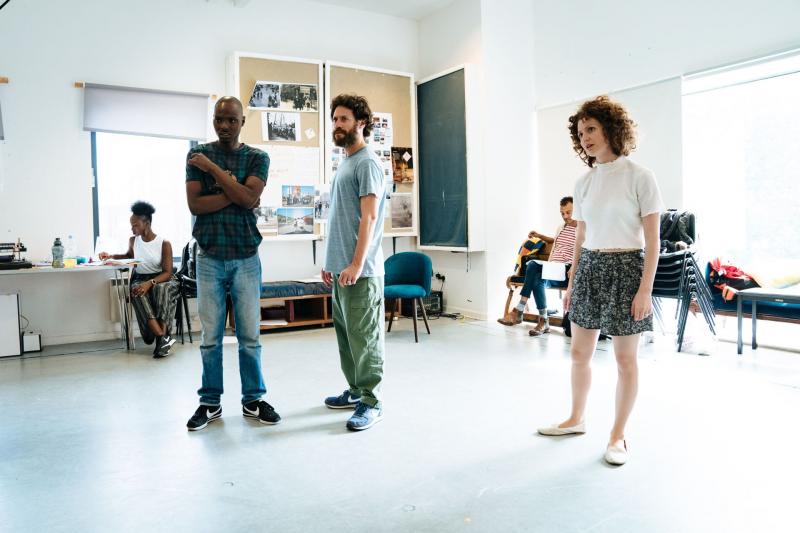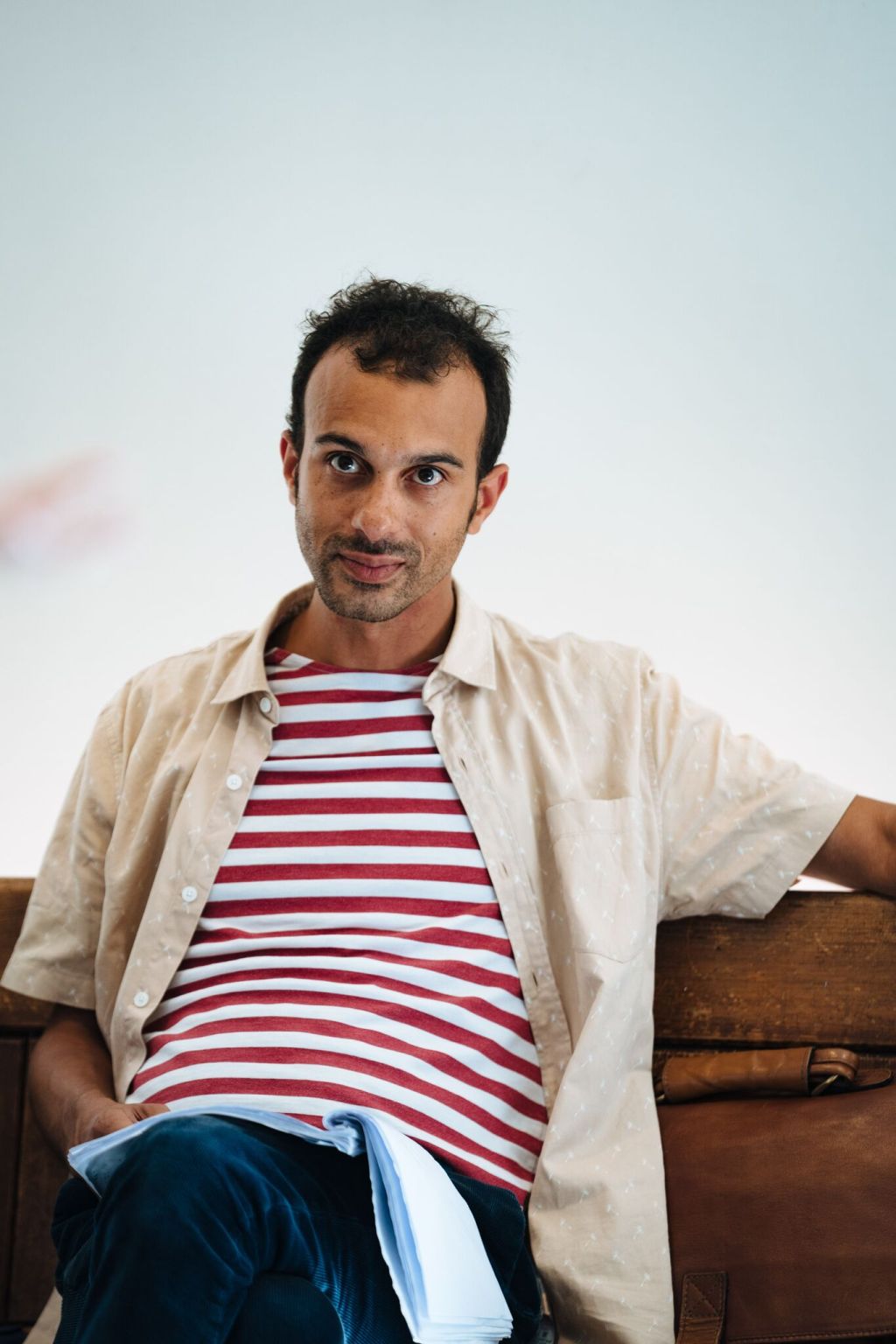First Person: Matthew Xia on why his production of 'Amsterdam' feels especially pertinent and vital now | reviews, news & interviews
First Person: Matthew Xia on why his production of 'Amsterdam' feels especially pertinent and vital now
First Person: Matthew Xia on why his production of 'Amsterdam' feels especially pertinent and vital now
The director sets the scene for his debut production at the helm of Actors Touring Company

I’m currently opening Amsterdam, my first production for Actors Touring Company since being appointed Artistic Director last year, at the Orange Tree theatre in Richmond and then in Plymouth early in 2020. And what better time to premiere a play for the Europe of the present, triggered by the Europe of the past.
I was born in East London in the 1980s but have never felt particularly English, though perhaps twice in my adult life I have felt British. Somehow I’ve always had this sense of being an outsider – the only brown kid on the white side of the family, the only brown kid on the black side of the family. Then I learnt about Empire, and the transatlantic slave-trade, and the atrocities in Asia, Africa, Australasia and the Americas at the hands of the Europeans (including the British) and any sense of a national historic pride was eliminated. It's no wonder that I am therefore drawn to a play that deals with the legacy of place, what it is to be an outsider, and specifically, the current hostility across Europe towards people perceived to be "other" and from "elsewhere" (Matthew Xia pictured below).
 I love to walk around surrounded by the physical and architectural reminders of the cities I’ve lived in, but this can be painful: the Royal Exchange in radical Manchester (and its significant connection to the cotton trade); in Liverpool by Sefton Park, the Everyman or the docks (Liverpool ships transported half of the three million Africans carried across the Atlantic by the British); and at my lovely new office at the Actors Touring Company above the ICA (caged in by Empire).
I love to walk around surrounded by the physical and architectural reminders of the cities I’ve lived in, but this can be painful: the Royal Exchange in radical Manchester (and its significant connection to the cotton trade); in Liverpool by Sefton Park, the Everyman or the docks (Liverpool ships transported half of the three million Africans carried across the Atlantic by the British); and at my lovely new office at the Actors Touring Company above the ICA (caged in by Empire).As Britain cuts itself off from the world and hurtles towards an inward-looking isolationism, it’s imperative to keep the voices of the marginalised alive. We are facing a significant threat to freedom of movement, immigration and citizens’ rights. Now is the time to drown out the intolerance and amplify the voices of those from far and wide. For Actors Touring Company this certainly includes international and cross-cultural writers within Europe and the UK, as well as those beyond. Let’s examine how groups and nations interact, exist with and effect one another in our hyperconnected world.
As an artistic leader I’m keen that we are not only presenting work that explores these themes, but also creating spaces which actively empower the underrepresented, throughout the cast, the creative team, and the stage management. It is a vital responsibility of theatre to promote truly cosmopolitan voices – from global cultures and those within our own nation – enabling audiences to connect with a universal humanity.
That humanity courses through Maya Arad Yusur’s play, Amsterdam, which presents the perspective of a foreign national in Europe – an Israeli violinist, living in a Dutch city. The ghosts of the past are ever-present in this play, walking the streets with our protagonist, forcing her to examine her identity and fuelling her paranoia. Of course, because Maya is writing about someone who is Jewish and female, European and Israeli whilst also examining Amsterdam, and because I can insist on the ethos of the organisation, we have also ensured that voices connected to these characteristics and cultures, which all feel very present in the play, have had major input in the rehearsal room. For me this ensures authenticity and sensitivity in the handling of the work.
Amsterdam presents a story centred around 24 hours in the life of a 9-month pregnant Jewish woman, living in a trendy canal-side apartment in the city centre. This protagonist, whose name we never learn, finds an unpaid gas bill from 1944 on her doorstep. A group of (rather excellent, in this case) performers create a narrative on this day that the gas bill is in her bag like a ticking bomb, reminding her of the history that floats around Amsterdam "like the train of a bridal gown". Over time, Amsterdam works on her, breaking her down and awakening sentiments of foreignness and alienation - forcing her to confront, or possibly construct a narrative of the past. In form, the play explores a notion of constructed narratives: stories and storytelling as a way of making sense of ourselves, our personal pasts and the bigger backcloth of history.
Amsterdam is a bold and powerful example of an international voice, the sort we are at risk of losing when we pull the drawbridge up.
Explore topics
Share this article
The future of Arts Journalism
You can stop theartsdesk.com closing!
We urgently need financing to survive. Our fundraising drive has thus far raised £49,000 but we need to reach £100,000 or we will be forced to close. Please contribute here: https://gofund.me/c3f6033d
And if you can forward this information to anyone who might assist, we’d be grateful.

Subscribe to theartsdesk.com
Thank you for continuing to read our work on theartsdesk.com. For unlimited access to every article in its entirety, including our archive of more than 15,000 pieces, we're asking for £5 per month or £40 per year. We feel it's a very good deal, and hope you do too.
To take a subscription now simply click here.
And if you're looking for that extra gift for a friend or family member, why not treat them to a theartsdesk.com gift subscription?
more Theatre
 Troilus and Cressida, Globe Theatre review - a 'problem play' with added problems
Raucous and carnivalesque, but also ugly and incomprehensible
Troilus and Cressida, Globe Theatre review - a 'problem play' with added problems
Raucous and carnivalesque, but also ugly and incomprehensible
 Clarkston, Trafalgar Theatre review - two lads on a road to nowhere
Netflix star, Joe Locke, is the selling point of a production that needs one
Clarkston, Trafalgar Theatre review - two lads on a road to nowhere
Netflix star, Joe Locke, is the selling point of a production that needs one
 Ghost Stories, Peacock Theatre review - spirited staging but short on scares
Impressive spectacle saves an ageing show in an unsuitable venue
Ghost Stories, Peacock Theatre review - spirited staging but short on scares
Impressive spectacle saves an ageing show in an unsuitable venue
 Hamlet, National Theatre review - turning tragedy to comedy is no joke
Hiran Abeyeskera’s childlike prince falls flat in a mixed production
Hamlet, National Theatre review - turning tragedy to comedy is no joke
Hiran Abeyeskera’s childlike prince falls flat in a mixed production
 Rohtko, Barbican review - postmodern meditation on fake and authentic art is less than the sum of its parts
Łukasz Twarkowski's production dazzles without illuminating
Rohtko, Barbican review - postmodern meditation on fake and authentic art is less than the sum of its parts
Łukasz Twarkowski's production dazzles without illuminating
 Lee, Park Theatre review - Lee Krasner looks back on her life as an artist
Informative and interesting, the play's format limits its potential
Lee, Park Theatre review - Lee Krasner looks back on her life as an artist
Informative and interesting, the play's format limits its potential
 Measure for Measure, RSC, Stratford review - 'problem play' has no problem with relevance
Shakespeare, in this adaptation, is at his most perceptive
Measure for Measure, RSC, Stratford review - 'problem play' has no problem with relevance
Shakespeare, in this adaptation, is at his most perceptive
 The Importance of Being Earnest, Noël Coward Theatre review - dazzling and delightful queer fest
West End transfer of National Theatre hit stars Stephen Fry and Olly Alexander
The Importance of Being Earnest, Noël Coward Theatre review - dazzling and delightful queer fest
West End transfer of National Theatre hit stars Stephen Fry and Olly Alexander
 Get Down Tonight, Charing Cross Theatre review - glitz and hits from the 70s
If you love the songs of KC and the Sunshine Band, Please Do Go!
Get Down Tonight, Charing Cross Theatre review - glitz and hits from the 70s
If you love the songs of KC and the Sunshine Band, Please Do Go!
 Punch, Apollo Theatre review - powerful play about the strength of redemption
James Graham's play transfixes the audience at every stage
Punch, Apollo Theatre review - powerful play about the strength of redemption
James Graham's play transfixes the audience at every stage
 The Billionaire Inside Your Head, Hampstead Theatre review - a map of a man with OCD
Will Lord's promising debut burdens a fine cast with too much dialogue
The Billionaire Inside Your Head, Hampstead Theatre review - a map of a man with OCD
Will Lord's promising debut burdens a fine cast with too much dialogue

Add comment